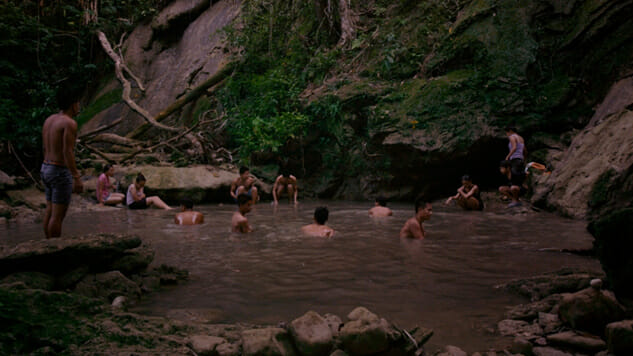
As fascinating as it is boring, Eduardo Williams’ feature-length debut is rapt with ideas and intelligence and effortless ambition—about the contradiction of our over-connected world; about the ways in which we record our individual history; about why we even record our individual histories—so rapt in fact that The Human Surge eventually disconnects from the audience completely. Which isn’t a particularly new criticism to levy at a film that flirts so openly with its “slow cinema” forebears—especially with fellow Argentine director Lisandro Alonso’s (Jauja) contemplative, surrealist work—but whereas Williams’ likeminded contemporaries like Lav Diaz or Carlos Reygadas or Apichatpong Weerasethakul use striking, surprising imagery to transcend or to punctuate the tedium of their films, Williams is much less willing to meet the audience half-way. When the films of those auteurs end, the viewer is left with something palpable, is reinvigorated, is ready to invest again into the difficult, obscure themes these films present. When The Human Surge ends, the viewer will probably be pretty OK with it being done.
Beginning in Buenos Aires, sidewinding into Mozambique, then into an ant colony and finally into Bohol in the Philippines, The Human Surge assigns a specific camera and corresponding aesthetic to each locale: 16 mm in South America, followed by a Blackmagic pocket camera in Africa (which is shot by a Super 16 off a computer monitor), followed by a RED HD rig for winding through the Bohol jungle. Williams isn’t concerned with defining place or providing narrative context as he is with allowing the many ways in which we can capture the world to govern the scope of what his film ultimately captures. In that sense, a documentary/fever dream aesthetic takes over early, in which a young man, Exe (Sergio Morisini), wades casually through a flooded thoroughfare, talking on the phone to his supposed employer while bystanders look directly into the camera as it passes, wondering what’s supposed to be going on.
We wonder the same thing—or, at least, that’s what we’re probably supposed to wonder. Throughout the film’s first third, Exe wanders disconnectedly from crowded house to crowded house, mostly trying to find someone with a working internet, which he needs to use to apply for a job(?), telling a person who may have been a relative or a family friend that he’s lost his position at a grocery store, which must have been what that earlier phone conversation was all about. Williams’ camera follows passively, with no real imperative to hold the audience captive to any narrative or to offer anything all that interesting to look at. A scene of an unexplained gathering inside a tree trunk where Exe’s Millennial friends say weird koan shit like “in the future the noise level of the food court will be accepted as silence” and a scene of a group of Exe’s Millennial guy friends half-assing a web cam sex show to make some quick money carry equal visual weight and relevance. Williams seems beholden only to following whatever visual whim distracts him, which could be fun for audiences were what Williams actually shows us just as compelling as the ideas he’s playing with.
No one really mentions the flood, and when Exe finally gets the chance to log into the internet, he tabs mindlessly between text windows and a live video of a group of young men in Mozambique as they fail to put on their own sex show. Exe’s screen takes over the film, and Williams stealthily moves across continents through a computer terminal, the film continuing to sidle up with more young people struggling to find purpose in lives despite their soul-draining occupations. Later, we move down a string of urine into a hill of worker ants, which takes us via underground burrows to the Philippines, where a young woman can’t enjoy herself swimming at the water hole because she needs desperately to find a “cybercafé.”
Often, Williams will rest his camera at a distance, overdubbing dialogue so that it’s difficult to tell who’s speaking. More often, a draining sense of dread settles over each scene—not only because Williams tends to chronicle his protagonists over their shoulders, shooting his mundane meanderings like they’re tense tracking shots between jump scares in a slasher movie. In Mozambique, a friend from work brings Alfie (Shine Marx) home, but when Alfie resists—unsettled by the state of his work friend’s home life, or maybe unnerved by his work friend’s lack of work-life filter—his work friend protests: “Come here, man, I need to show you this fucked up scene.” Williams presents no real context, letting all of it be simply and deeply uncomfortable. We dread having no idea what to expect in this horrifyingly connected world: Everything could be very dangerous, and Williams taps directly into that human fear.
It’s hypnotic all the same—if you’re willing to give Williams every shred of your attention. But people typically don’t agree to hypnosis for the sake of it, and The Human Surge reveals no major, self-defining truths through meditation. The director’s voice is remarkably clear as he lays out his thematic concerns, but The Human Surge never provides much insight beyond the acknowledgement that from the tiniest insect to the busiest family unit, every organism on this planet is wracked with anxiety over all the same dumb things. Still, Williams is a gifted director who only has better films in front of him; he appears to be a guy with a concise vision making exactly what he wants to make. Which might be why The Human Surge can’t quite connect: Williams only made this for himself.
Director: Eduardo Williams
Writer: Eduardo Williams
Starring: Sergio Morisini, Shine Marx, Domingos Marengula, Irene Doliente Paña, Chai Fonacier, Manuel Asucan, Rixel Manimtim
Release Date: March 3, 2017
Dom Sinacola is Sr. Assistant Movies Editor at Paste and a Portland-based writer. You can follow him on Twitter.